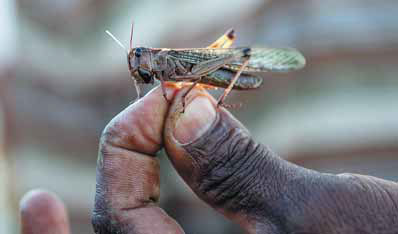Madagascar wages war on locusts
|
A member of the technical team of the Food and Agriculture Organization of the United Nations holds a locust at a camp on May 7 in Tsiroanomandidy, Madagascar. The team's mission is to fight swarming locusts with insecticides. Rijasolo / Agence France-Presse |
Near a locust-plagued village in Madagascar's stunning central highlands, helicopters loaded with insecticide swoop in and let it fall.
"The goal is to break the invasion," explained Tsitohaina Andriamaroahina, head of a UN mission to end the insect attack that threatens the crops of 13 million farmers in this island nation.
In their countless billions the insatiable hordes cloud the skies as they spread across two thirds of Madagascar, affecting an area roughly the size of Germany or Japan.
Columns of thick black smoke rising from the rolling grasslands surrounding the village of Amparihibe, 200 kilometers west of the capital, Antananarivo, as desperate farmers set fires to disperse the crop-devouring swarms.
The airborne locust bombers use the telltale smoke signals to help them target the insects during daily patrols with three helicopters and an airplane operating from mobile air bases.
"When we fly a scouting mission, we look at several things: the wind direction, the smoke, the position of the sun. All of that shows us where the swarms are," said Hasibelo Rakotovao, one of the team members.
The 90 people in the joint operation of the UN's Food and Agriculture Organization and Madagascar's anti-locust agency have already sprayed 500,000 liters of pesticide over one million hectares of land.
Once the insects have been spotted, a technical team arrives before sunrise in a truck carrying pesticide containers that will be attached to the helicopters.
The team moves quickly, as they can only spray at dawn, when the locusts are immobile on the ground, their wings weighed down by the morning dew.
The pesticide affects only the insects, according to the mission, neutralizing their nervous systems. Villagers then collect the locusts and feed them to their pigs.
"We help one another among neighbors, but we aren't enough. We are up to our knees in locusts and can't cope anymore," said Marie Louise Rasoamampionona, a farmer.
"We have to start bush fires because there's no other way to chase them away."
The swarms have multiplied uncontrollably in recent years because of government inaction during politically turbulent times that saw a suspension of foreign aid to the country.
The airborne operation currently underway is seen as the only solution to the plague, but it is far from over. The FAO still needs $14 million to see the project through over the next two years.
Despite the efforts from the air, which have annihilated hundreds of swarms in the past few weeks, local people say they have already been hurt by rice shortages.
"The locusts cause farmers a lot of suffering because rice is our livelihood," said Ranaivo, a peasant farmer from Amparihibe.
"If it is destroyed, we are lost. What will we eat? If we only eat cassava, it doesn't give us enough energy to work. Rice is essential."
Even if the current plague is brought under control, other problems, such as environmental degradation, point to more trouble in the future.
Increased deforestation heightens the risk of insect swarms, meaning that new locust invasions loom on the horizon.
Around 200,000 hectares of forest is eliminated every year. Ninety percent of Madagascar's rain forest has been lost already.




























